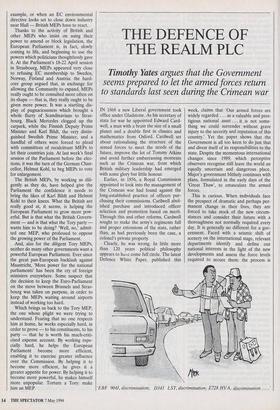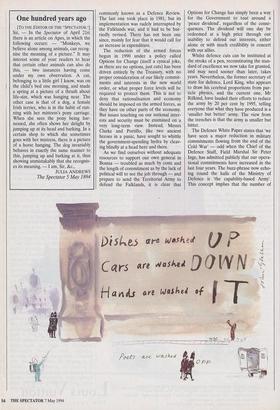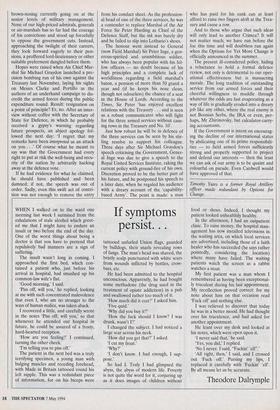THE DEFENCE OF THE REALM PLC
Timothy Yates argues that the Government seems prepared to let the armed forces return to standards last seen during the Crimean war IN 1868 a new Liberal government took office under Gladstone. As his secretary of state for war he appointed Edward Card- well, a man with a brain the size of a small planet and a double first in classics and mathematics from Oxford. Cardwell set about rationalising the structure of the armed forces to meet the needs of the future, improve the lot of Tommy Atkins and avoid further embarrassing moments such as the Crimean war, from which British military leadership had emerged with some glory but little honour.
Earlier, in 1856, a Royal Commission appointed to look into the management of the Crimean war had found against the long-established practice of officers pur- chasing their commissions. Cardwell abol- ished purchase and introduced officer selection and promotion based on merit. Through this and other reforms, Cardwell sought to make the army's regiments full and proper extensions of the state, rather than, as had previously been the case, a colonel's private property.
Clearly, he was wrong. In little more than 120 years political philosophy appears to have come full circle. The latest Defence White Paper, published this week, claims that 'Our armed forces are widely regarded . . . as a valuable and pres- tigious national asset . . . it is not some- thing we could surrender without grave injury to the security and reputation of this country.' Yet the paper shows that the Government is all too keen to do just that and divest itself of its responsibilities to the state. Despite the momentous international changes since 1989, which perceptive observers recognise still leave the world an equally uncertain and dangerous place, Major's government blithely continues with plans, formulated in the early days of the `Great Thaw', to emasculate the armed forces.
This is curious. When individuals face the prospect of dramatic and perhaps per- manent change in their lives, they are forced to take stock of the new circum- stances and consider their future with a thoroughness not normally required every day. It is generally no different for a gov- ernment. Faced with a seismic shift of scenery on the international stage, relevant departments identify and define our national interests in the light of the new developments and assess the force levels required to secure them: the process is 'EBF 904J, discrimination; D343 LST, discrimination; E728 HVA, discrimination . . commonly known as a Defence Review. The last one took place in 1981, but its implementation was rudely interrupted by the Falklands war, and it had to be hur- riedly revised. There has not been one since, mainly for fear that it would call for an increase in expenditure.
The reduction of the armed forces begun in 1990 under a policy called Options for Change (itself a cynical joke, as there are no options, just cuts) has been driven entirely by the Treasury, with no proper consideration of our likely commit- ments and interests in the new world order, or what proper force levels will be required to protect them. This is not to deny that rationalisation and economy should be imposed on the armed forces, as they have on other parts of the economy. But issues touching on our national inter- ests and security must be examined on a very long-term view. Instead, Messrs Clarke and Portillo, like two ancient heroes in a panic, have sought to whittle the government-spending hydra by cleav- ing blindly at a head here and there.
As we find ourselves without adequate resources to support our own general in Bosnia — troubled as much by costs and the length of commitment as by the lack of political will to see the job through — and prepare to send the Territorial Army to defend the Falklands, it is clear that Options for Change has simply been a way for the Government to tout around a `peace dividend', regardless of the conse- quences. The dividend will one day be redeemed at a high price through our inability to defend our interests, either alone or with much credibility in concert with our allies.
Whilst defence cuts can be instituted at the stroke of a pen, reconstituting the stan- dard of excellence we now take for granted, and may need sooner than later, takes years. Nevertheless, the former secretary of state for defence, Lord King, who appears to draw his cerebral proportions from par- ticle physics, and the current one, Mr Rifkind, have lauded their efforts to reduce the army by 20 per cent by 1995, telling everyone that what they have produced is a `smaller but better' army. The view from the trenches is that the army is smaller but bitter.
The Defence White Paper states that 'we have seen a major reduction in military commitments flowing from the end of the Cold War' — odd when the Chief of the Defence Staff, Field Marshal Sir Peter Inge, has admitted publicly that our opera- tional commitments have increased in the last four years. The buzz-phrase now echo- ing round the halls of the Ministry of Defence is 'the capability-based Army'. This concept implies that the number of soldiers under arms and the support they need are of marginal concern to our defence interests. Apparently, what is Important is to have a few troops who can do lots of different things: a kind of gen- darmerie rather than a properly constituted army ready to meet specific requirements of the moment. But wearing three or four different hats is all very well so long as you do not have to wear them all at once.
Despite the outcry which greeted the Archbishop of Canterbury's leaked asser- tion that 'we have lost nearly all our Navy and Air Force and so on. We're a pretty ordinary little nation, yet we don't realise it,' he had a point. The high regard in which our armed forces have been held abroad, which the White Paper recognises, has been due, first, to their success at arms, and, second, to our ability to project them around the globe as an arm of policy on our own account. Sadly, this is no longer the case.
To put a fully equipped division in the Gulf war, the British Army of the Rhine was stripped bare to provide both the man- power and equipment for that campaign and could not then have withstood an assault from Estonia, let alone other large, more volatile areas of the former Soviet Union.
The swingeing cuts already imposed on our defence capability — with more to come — mean that we are now reduced to penny-packeting our fighting formations alongside those of other nations. As size of contribution is important in determining structures of command, we shall from now on, when our forces deploy in partnership with others, always be subordinate to who- ever fields larger forces: in the Gulf it was the Americans; in the European army, now germinating in Strasbourg with the estab- lishment of a European Corps, it will be either the French or the Germans. In a world where economic clout and the ability to 'punch our weight' militarily are still the • . But I must stop banging on about Major. Will you vote for us?' requirements to play in the First XI, Dr Carey's lament was as accurate as it was timely.
But the Government has some sort of method in its madness; it appears to believe — move over, Cardwell — that it can begin to reprivatise the defence of the realm. Bold ideas are now being canvassed for more defence cuts in a series of Defence Cost Studies, known collectively as 'Front Line First', which aims to reduce support costs, without affecting the front line, by involving the private sector.
One proposal is to lease the armed forces' fleet of 95,000 non-fighting vehicles from private contractors, much in the same way as British Rail is to lease its rolling-stock. Whether the military leasing contracts will allow the vehicles to be taken abroad to be shot up by mean-spirit- ed individuals with whom we find our- selves at war is a small point yet to be resolved.
Another idea, hatched, apparently, in the mind of Malcolm Rifkind, is to find sponsors for the royal yacht Britannia. The royal family used to issue royal warrants to sundry traders and purveyors of royal goods. Now, it seems that the royal family is to be subject to their seal of approval, with 'By Appointment to Andrex, Jewsons, etc.' plastered all over the boat. But why stop at the top? Appropriate private consortiums could bid for the larg-
er corps: Costains, Tarmac and Woodrow Taylor for the Royal Engineers, British Telecom and Mercury for the Royal Sig- nals, Rover, oops, BMW, and Russell Hobbs kettles for the Royal Electrical and Mechanical Engineers, and so on.
The City and other successful businesses could take over individual cavalry, infantry and artillery units. Perhaps we should brace ourselves for the Royal House of Fraser Life Guards, the Allied Dunbar Hussars, the Royal Irish Guinness Regiment, the Macallan Highland Fusiliers, the Royal Next Green Jackets or Midland Bank Tank Regiment. In line with market-testing and to recoup some of their investment, all these public-spirited companies could be allowed to reintroduce the purchase of commissions on a sliding scale, depending on rank and regiment: £20,000 for a sec- ond-lieutenant, and about £100,00 for a lieutenant colonel. Furthermore, to distin- guish themselves on parade, regiments could reintroduce the tradition of colourful uniforms drawn from the Regency period, and replace existing cap badges with com- pany logos.
In time, the scheme could be extended to the Royal Navy and the Royal Air Force, encouraging P&O, Sealink, Lymington Yacht Haven, British Airways and others to do their bit. Quite apart from the enor- mous savings to the Treasury, such a policy would mitigate the worst effects of the brown-nosing currently going on at the senior levels of military management. None of our high-priced admirals, generals or air-marshals has so far had the courage of his convictions and stood up forcefully to oppose the government cuts. Instead, approaching the twilight of their careers, they look forward eagerly to their pen- sions, a proffered lord-lieutenancy or other suitable preferment dangled before them.
Hopes were raised when Air Chief Mar- shal Sir Michael Graydon launched a pre- cision bombing run of his own against the Treasury last November, laying his sights on Messrs Clarke and Portillo as the authors of an underhand campaign to dis- credit the armed forces during the public expenditure round. Result: resignation on a point of principle? Er, no. After an inter- view without coffee with the Secretary of State for Defence, in which he probably received a gypsy's warning regarding future prospects, an abject apology fol- lowed the next day: 'I regret that my remarks have been interpreted as an attack on you . . Of course what he meant to say was that the Government had every right to put at risk the well-being and secu- rity of the nation by arbitrarily hacking away at the defence vote.
If he had evidence for what he claimed, he should have published and been damned; if not, the speech was out of order. Sadly, even this swift act of contri- tion was not enough to remove the entry from his conduct sheet. As the profession- al head of one of the three services, he was a contender to replace Marshal of the Air Force Sir Peter Harding as Chief of the Defence Staff, but the ink was barely dry and he failed to slip into Lothario's shoes.
The honour went instead to General (now Field Marshal) Sir Peter Inge, a gen- erous-spirited and unambitious soldier, who has always been popular with his fel- low officers — no doubt because of his high principles and a complete lack of worldliness regarding a field marshal's baton, a pension of more than 50 grand a year and (if he keeps his nose clean, though not odourless) the chance of a seat in the House of Lords. According to the Times, Sir Peter 'has enjoyed excellent relations with the Treasury . . . and is seen as a robust communicator who will fight for the three armed services without caus- ing rows in the Treasury and No. 10'.
Just how robust he will be in defence of the three services can be seen by his Stir- ling resolve to support his colleague. Three days after Sir Michael Graydon's speech criticising the Government, Gener- al Inge was due to give a speech to the Royal United Services Institute, raking the current policy with ground-fire of his own. Discretion proved to be the better part of his future, and he postponed his speech to a later date, when he regaled his audience with a dreary account of the 'capability- based Army'. The point is made: a man who has paid for his rank can at least afford to raise two fingers aloft at the Trea- sury and cause a row.
And to those who argue that such ideas will only lead to another Crimea? It will not matter much; we have run before the foe this time and will doubtless run again when the Options for Yet More Change is officially announced in the summer.
The present ill-considered policy, hiding a reluctance to hold a formal defence review, not only is detrimental to our oper- ational effectiveness but is massacring morale. The long tradition of outstanding service from our armed forces and their cheerful willingness to muddle through whatever the odds are fast evaporating as a way of life is gradually eroded into a dreary job like any other, where the real enemy is not Bosnian Serbs, the IRA or even, per- haps, Mr Zhirinovsky, but calculator-carry- ing accountants.
If the Government is intent on encourag- ing the decline of our international status by abdicating one of its prime responsibili- ties — to field armed forces sufficiently strong and properly supported to project and defend our interests — then the least we can ask of our army is to be quaint and colourful on parade. Even Cardwell would have approved of that.
Timothy Yates is a former Royal Artillery officer made redundant by Options for Change.





















































 Previous page
Previous page